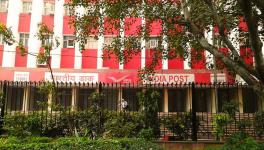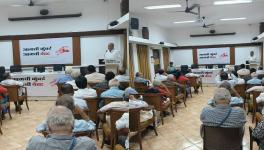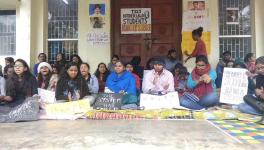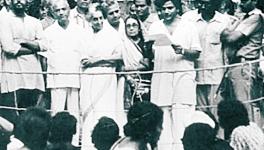Fee Hike Means Further Exclusion of Common Students from Education
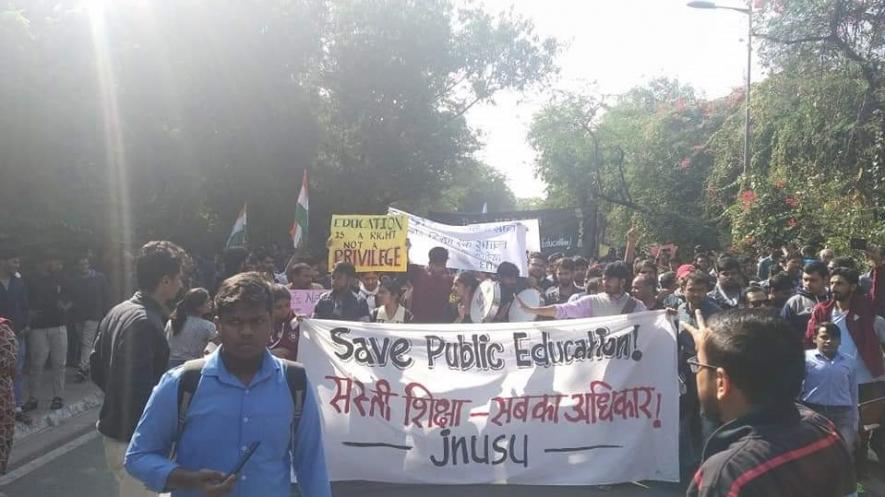
The debate around fee hike in educational institutions across India in the recent times cannot be seen in isolation but as a part of the education policy of the Bharatiya Janata Party-led central government. During the last five and half years of Modi 1.0 and present Modi 2.0 regime, newspapers have been full of reports of fee hike in educational institutions right from Indian Institute of Technologies (IITs) to central universities to schools. The latest fee hike in the Jawaharlal Nehru University (JNU) has brought this issue to focus but numerous institutions have already implemented fee hike. The fees of IITs have been increased twice in the last two years. Recently, a 900% hike in fees for MTech courses was announced by the council of IITs. The tuition fee which was between Rs 20,000 and Rs 50,000 was increased to Rs. 2 lakh. Students of Tata Institute of Social Sciences (TISS) campuses have been waging a battle on the issue of fellowship and fee hike. Students of Pondicherry University successfully forced authorities to rollback the unjustified exorbitant amounts of fee hike. Parents of students studying in private schools in Shimla are forced to agitate almost every year against the fee hike and this list goes on.
The BJP government is continuing the same neo-economic policies championed by the earlier successive Congress governments. However, by now, the initial euphoria surrounding the introduction of the neo-liberal economic policies is slowly losing its steam. Twenty-five years of neo-liberalism have confirmed our worst apprehensions. Crass commercialisation and abdication of the responsibility of the State towards education have thoroughly changed the face of our education system. Presently, along with other effects, two concrete results of these policies in the Indian education system can be seen in the form of rampant commercialisation and latest in the form of huge fee hike. This fee hike is not just limited to the private sector but continuous fee hike can be seen in public sector educational institutions too. Examples from both sectors are discussed below to understand the issue.
It is an established fact that privatisation has already excluded a vast section of students from quality education. In other words, it has given the privilege of accessing majority of educational institutions to the affluent section of the society. Any step of privatisation always leads to the exclusion of economically and socially deprived sections from education. In India, more than 68% of students in higher education and more than 37% of school students are going to the private sector. The affordability of the private sector is further decreasing with a continuous increase in the fees. Private institutions are free to increase their fees according to their business model going against all rules and regulations. The recent case of fee hike in Bachelor of Ayurvedic Medicine and Surgery (BAMS) course by 13 private colleges in Uttarakhand is a classical case where more than 3,500 students are demanding a rollback of the unjust fee-hike. They have been on hunger strike for the last couple of months. Colleges are collecting fees defying the decision of the Uttarakhand High Court. The fee was hiked from Rs 80,000 to Rs 2.15 lakh in 2015 which was stayed by a single bench of the high court and managements were asked to return the excess amount collected. The managements challenged the Order and a division bench of the high court on October 9, 2018, ruled that they agree with the view of the learned single judge. The college managements are not only flouting the HC order but have also resorted to threats, intimidation and physical assault on students.
Also read: Why India Needs an Absolutely Free Public Education System
Fee hike of public sector educational institutions is further leading to the exclusion of common students even from the public sector. The fee hike in JNU is the best example to understand this phenomenon. JNU is known for its inclusive nature and has produced generations of socially conscious citizens and nation builders owing to this character of providing affordable education drawing in students from the backward regions and marginalised sections. One can find a picture of real India in any classroom in any course in JNU. The history of JNU is full of stories of successful students from poor backgrounds who were not able even to pay the minimum fee and hostel charges. The recent fee hike will deprive most of these students. The fees for a hostel room that is currently Rs 20 and Rs 10 for double and single-occupancy per month, respectively, had been proposed to increase to Rs 600 and Rs 300 (Rs 300 and Rs 150 after partial rollback) with refundable mess security of Rs 12,000 (Rs 5,500 after partial rollback). The contentious ‘service charges’, comes to around Rs 1,700 per month. Assuming electricity and water charges at Rs 500 per month, and mess charges at Rs 2,500 per month, a JNU student will have to pay almost Rs 60,700 per year for a double-occupancy room in the hostel. For a single-occupancy, it comes up to Rs 62,500. This amount may not be significant for the upper-middle class but is a huge amount for the students from deprived sections. According to JNU’s annual report, around 40% of the students admitted in 2017 had a family income of less than Rs. 12,000 per month. All these students will be forced to leave their studies. Apart from the fee hike, the new hostel manual of JNU has put an end to the reservation process in the hostel allocation. In a campus that is famous for its women-friendly environment and gender equality, a dress code is also proposed. The case concerning fee hike is similar in most of the public sector educational institutes that are severely depriving students of education.
The huge fee hike is nothing but backdoor privatisation of public educational institutions where students have to bear the cost of their education and the government is withdrawing from its responsibility by not allocating required funds. In most of the institutions, the grants are not increasing over a period of time or if increased, it is only by minuscule amounts which are far less than the inflation rate. Already, a big percentage of the courses, run in the name of self-financing courses, require students to finance their education within public sector education. The rampant fee hike is further aggravating the situation on the campuses.
In most cases, fee hike is being resisted and militant struggles have taken place even in those campuses where organised student movement is not there. However, the dangerous trend is that there is a general acceptance of fee hike by our society. This fee hike of students is not a simple phenomenon and cannot be compared with the price hike of other essential commodities as is generally equated by the advocates of fee hike. Education is not a commodity but a service, a service whose value cannot be measured in monetary terms. It is a well-established fact that the cost of education cannot and should not be paid by students in a social welfare state.
The other part of the debate is the common narrative put forward by the upper-middle class who boast for their taxes. There is an organised campaign by a section of media and social media after the JNU fee hike that students should pay for their education and this is a mere wastage of tax money, which is collected from the common citizens to provide subsidised education in institutions of higher learning like JNU. The argument is full of hypocrisy as none of these voices are heard when big tax concessions are given to corporates, taxpayers' money is looted through corruption and bank frauds like non-performing assets (NPA) come to the light every other day. The middle class’s cheers for installation of statues worth thousands of crores and their hue and cry on subsidy for education itself shows the importance given to education by our ruling class. The progressive and like-minded forces of society should expose this campaign. The basic question is that if this revenue collected through the taxes is not used for education and health services then what is the purpose of tax collection? It should also be conveyed loudly that education loans couldn’t be proposed as an alternative to government spending on education, as students are already falling victim to these education loans and forced to take extreme steps including killing themselves.
In any democratic country, people elect a government with the hope that the government will bring policies that will benefit their lives. It is the responsibility of an elected government to ensure the basic amenities of health, education, housing, etc. to all. The provisions in the Indian Constitution make it binding for the government to treat all its citizens equally irrespective of their caste, religion, region, and language. However, what we are witnessing in India today is in sharp contrast to the basic principles of democracy in general and the Indian constitution in particular. Besides, the ruling government has failed to stand by its own tall promises. From adopting anti-student policies to trampling upon constitutionally guaranteed rights, the BJP-led government has thoroughly worked towards destroying educational institutions ever since it has come to power.
Also watch: JNU Protest: May Have to Quit After Fee Hike, Say Students
But this is not just in India, it is a global trend in capitalist countries. Globally, there is an increase in the number of university students. Despite this, government spending on education all across the world has declined while tuition fees have risen. With crippling student debts and increasing burden of higher education expenses and the lack of jobs to compensate the same, students today realise that the future is not as rosy as it seemed. All of this has mobilised students against the existing system, as they demand free higher education. As seen in the examples of Chile and South Africa, the unilateral focus on reducing tuition fees can significantly impact the political landscape. In India, too, there is growing resistance against these policies. Students are keeping up the struggle but it is not the responsibility of students alone. It is the responsibility of the whole society to stand against this attack on education. We need to campaign vigorously against the popular narrative of the ruling class. Society should not only show their solidarity with the struggles against the fee hike in various campuses but also actively participate in these struggles.
The author is former general secretary of the Students’ Federation of India. Views are personal.
Get the latest reports & analysis with people's perspective on Protests, movements & deep analytical videos, discussions of the current affairs in your Telegram app. Subscribe to NewsClick's Telegram channel & get Real-Time updates on stories, as they get published on our website.









